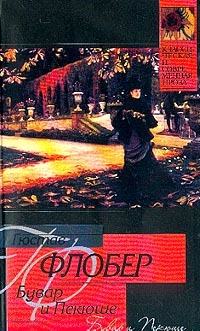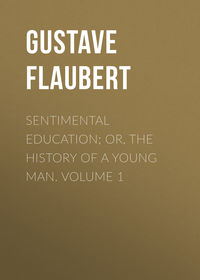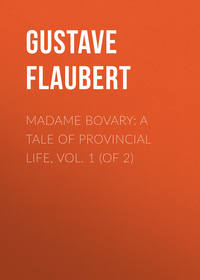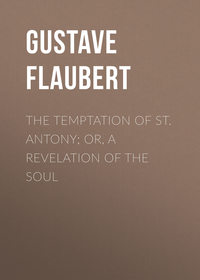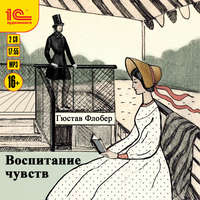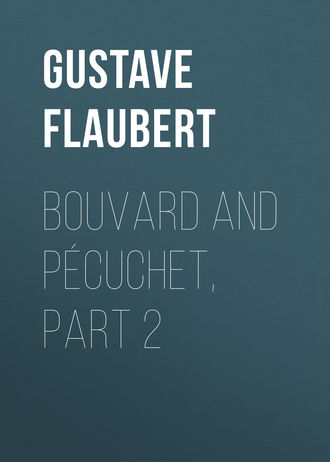 полная версия
полная версияBouvard and Pécuchet, part 2
Sometimes, however, you are bold enough to act; but it almost creates a scandal: as when the ex-Rue de l’Impératrice, now the Rue Jeanne-Darc, and the Square Solferino were opened in Rouen. Still: “Public parks are the style now, and Rouen must have one!”9
But the most important, though the most neglected, of all your projects is the distribution of water throughout the city. Take Saint-Sever, for example, where there is great need of it. What we proposed was, to erect, at any street corner, a small fountain adorned with a statue. Several of you had formally promised that our fountain should be erected; we were therefore greatly surprised at your decision, inasmuch as you are sometimes generous in these matters. The statue to Napoleon I. on the Place Saint-Ouen is an instance. You gave, for the erection of this masterpiece, which had cost 160,000 francs or thereabouts, the small sum of 30,000 francs! The council had appropriated the first time 10,000 francs; the second time, 8,000; and the third time, 5,000, as indemnity to the sculptor, because his maquette had casually been overthrown by the committee – always the committee! What aptitude for art! For the statue of Pierre Corneille, proposed in 1805 and erected twenty-nine years later, 1834, you spent 7,037.38 francs – not a cent more. True, he was a great poet, and you are so considerate that you prefer to deprive yourselves of a necessity, rather than honour a second-rate poet!
Permit me to ask two questions: If this fountain, this useful public monument which we offered, had represented anything but Louis Bouilhet’s bust, would you have refused it? If it had been intended for one of the capitalists of our district, whose fortune runs into the millions, would you have refused it? I doubt it.
Be careful, or you will be accused of despising those who cannot boast of a fortune! For such cautious men, who consider success the main object, you have sadly erred, gentlemen! The Moniteur Universel, l’Ordre, the Paris-Journal, the Bien Public, the XIXème Siècle, l’Opinion Nationale, the Constitutionnel, the Gaulois, the Figaro, in fact, nearly all the papers, were against you. To convince you, we will simply quote a few lines from the dean of modern critics, Jules Janin:
“When the time came for definitive compensation, the last hope of Louis Bouilhet’s friends was dashed to the ground; they encountered all sorts of obstacles. His statue was refused a place in a city that his fame had made illustrious! His friends proposed in vain to erect a much needed fountain, so that the statue ornamenting it might not be thought the main object of this good deed. But how can unjust men understand the cruelty of such a refusal? They might erect a statue to war, but to a poet, never!”
Of the twenty-four composing the committee, eleven sided with us; and Messrs. Vaucquier du Traversin, F. Deschamps and Raoul Duval spoke eloquently in our favour. This affair is trifling in itself, but it may be noted as a characteristic feature of the century – of your class.
“I address myself to you no longer, gentlemen, but to all the bourgeoisie. Therefore I say: Conservators who conserve nothing, it is time to follow a different path. You speak of decentralizing, regenerating, – if so, rouse yourselves. Be active! Originate! French nobles lost their prestige for having had, during two centuries, the feelings of menials. The end of the bourgeois is at hand, because their feelings are those of the rabble. I do not see that they read different papers, or hear different music, or that their pleasures are more refined. In one as in the other, it is the same love of money; the same wish to destroy idols; the same hatred of superior minds; the same meanness; the same crass ignorance.”
Of the seven hundred members of l’Assemblée Nationale, how many are there who could name six kings of France, who know the first rudiments of political economy, who have even read Bastiat? The whole municipality of Rouen, who disowned a poet’s talent, no doubt are ignorant of the rules of versification. They do not need to know them, so long as they do not meddle with poetry.
To be respected by those beneath us, we must respect those above us! Before educating the rabble, educate yourselves! Enlightened people, enlighten yourselves! Because of your disdain for superiority, you think you have abundant good sense, you are positive, you are practical. One is never really practical unless he carries it a little farther… You would not enjoy the benefits of industry if your ancestors of the eighteenth century had had other ideals than common usefulness. How we scoffed at Germany – at her dreamers, her ideologists, her ethereal poets! Our milliards compensated her for the time well employed in perfecting plans. It seems to me, it was the dreamer Fichte who reorganized the Prussian army after Jena; and that the poet Koërner sent a few Uhlans against us about 1813!
You practical? Come! You cannot even hold a pen or a gun! You let convicts rob, imprison, and slaughter you! You have lost even the brute’s instinct of defence; and when not only your life, but your purse (which ought to be dearer to you), is in danger, you lack the energy to drop a ballot into a box! With all your capital, all your wisdom, you never can form an association equal to l’Internationale! All your intellectual efforts consist of trembling for the future. Think! Hasten! or France, between a hideous demagogy and a stupid bourgeoisie, will sink lower and lower!
Gustave Flaubert.SELECTED
C O R R E S P O N D E N C E
OF
GUSTAVE FLAUBERT
WITH AN
INTIMATE STUDY OF THE AUTHOR
BY
CAROLINE COMMANVILLE
INTIMATE REMEMBRANCES
OF
GUSTAVE FLAUBERT
I
THESE pages are not a biography of Gustave Flaubert, they are simply recollections; my own and those I have collected.
My uncle’s life was passed entirely in the intimacy of the family, between his mother and me; to relate the story of this life is to make him better known, more loved and esteemed; in this way I believe that I am fulfilling a pious duty towards his memory.
Before Gustave Flaubert’s birth, my grandparents had had three children. The eldest, Achilles, was nine years older than Gustave, and the two other little ones were dead. Then came Gustave and another boy who died in a few months; and finally my mother, Caroline, the last child.
She and her younger brother loved each other with a peculiar tenderness. With but three years difference in their ages, the two little ones were scarcely ever separated from each other. Gustave repeated everything he learned to his sister; she was his pupil, and one of his greatest pleasures was initiating her into literary composition. Later, when he was in Paris, it was to her he wrote; through her was the daily news transmitted to their parents, because that sweet communion had not been lost.
I should say that the greater part of the facts relative to my uncle’s infancy have been told me by the old nurse who brought him up and who died three years after him, in 1883. The familiarity permitted with a child was followed in her case by a respect and worship for her master. She was “full of him,” recalling his least action, his least word. When she said “Monsieur Gustave,” she believed that she was speaking of an extraordinary being. Those who knew him will appreciate the verity contained in the admiration of this old servant.
Gustave Flaubert was four years old when Julie came to Rouen into my grand-parents’ service, in 1825. She came from the village of Fleury-on-the-Andelle, situated in that pretty, smiling valley which extends from Pont-Saint-Pierre to the great market-town of Lyons-la-Forêt. The coast of the “Two Lovers” protected its entrance; here and there was a château, sometimes surrounded by water and having its drawbridge, again the superb estate of Radepont, the ruins of an old abbey and the woods of the surrounding hills.
This charming country is fertile in old stories of love and of ghosts. Julie knew them all. She was a skilful story-teller, this simple girl of the people, and endowed with a naturally fine and agreeable mind. Her ancestors, from father to son, had been postilions, rather bad fellows, and hard drinkers.
While Gustave was small he would sit beside her for whole days. In order to amuse him, Julie would join together all the legends she had heard around the fire with those she had read, and, having been kept in bed a year with a bad knee, she had read more than most women of her class.
The child was of a tranquil nature, meditative, possessing an ingenuousness of which he retained traces during his whole life. My grandmother has told me that he would remain for hours with a finger in his mouth, absorbed, and with an almost stupid appearance. When he was six years old an old domestic, called Pierre, used to amuse himself with that innocence; he would say to little Gustave, if he teased for anything, “Go now and look at the end of the garden, or in the kitchen and see whether I am there.” And the child would go and say to the cook: “Pierre sent me to see whether he were here.” He could not comprehend that they were deceiving him, and while they laughed, would stand thinking, trying to see through the mystery.
My grandmother had taught her oldest son to read, and, wishing to do as much for the second, put herself to the task. The little Caroline, beside Gustave, learned by degrees that she could not keep up with him, and he, being forced to understand this from signs of which no one said anything to him, began to weep large tears. He was, however, eager for knowledge, and his brain worked continually.
Opposite the hospital, in a modest little house in the Rue de Lecat, lived two old people, Father and Mother Mignot. They had an extreme tenderness for their little neighbour. Times without number, the child would open the heavy door of the Hôtel-Dieu, and run across to Father Mignot’s knee, upon a signal from him. And it was not the good woman’s strawberries that tempted him, but the stories the old man told him. He knew a great many pretty tales of one kind and another, and with what patience he related them! From this time Julie was supplanted. The child was not difficult to please, but had insistent preferences; those that he liked must be told him over and over again.
Father Mignot also read to him. Don Quixote especially pleased my uncle; he would never let it be taken from him. And he retained for Cervantes the same admiration all his life.
In the scenes brought about by the difficulty of learning to read, the last irrefutable argument with him was: “Why should I learn, since Papa Mignot can read to me?”
But the age for entering school arrived. He must know once for all that his old friend could not follow him there. Gustave put himself resolutely to work, and at the end of a few months had caught up with the children of his age. He entered the eighth class.
He was not what one would call a brilliant pupil. Continually failing to observe some rule, and not troubling himself to understand his professors, punishments abounded, and the first prize escaped him, except in history, in which he was always first. In philosophy he distinguished himself, but he never comprehended mathematics.
Generous and full of exuberance, he had some warm friends whom he amused extremely by his unquenchable enthusiasm and good humour. His melancholy times, for he had them even then, he passed in a region of his mind accessible to himself alone, and not yet did he show them in his exterior life. He had a great memory, forgetting nothing, neither benevolences nor vexation of which he was the subject. Thus, he preserved for his professor in history, Cheruel, a profound remembrance, and hated a certain usher who had hindered him from reading his favourite book during the study hour.
But his years at the college were miserable; he never could become accustomed to things there, having a horror of discipline, and of everything that savoured of militarism. The custom of announcing the change of exercises by the beating of drums irritated him, and that of filing the pupils in rank when they passed from one class to another exasperated him. Constraint in his movements was a punishment, and his walk with the procession every Thursday was never a pleasure; not that he was feeble, but he had a natural antipathy for all that seemed to him useless motion. His antipathy for walking lasted his whole life. Of all exercises for the body, swimming alone pleased him; he was a very good swimmer.
The dull, labourious days of school life were enlivened by outings on Thursdays and Sundays. Then he saw his beloved family and his little sister, which was a joy unequalled.
In the dormitory during the week, thanks to some hidden pieces of candle, he read some of Victor Hugo’s dramas, and his passion for the theatre was kept warm. From the age of ten, Gustave composed tragedies. These pieces, of which he was scarcely able to write the lines, were played by him and his comrades. A great billiard hall opening from the salon was given up to them. The billiard table, pushed to one end of the room, served as a stage, which they mounted by means of a crock from the garden. Caroline had charge of the decorations and costumes. His mother’s wardrobe was plundered for old shawls, which made excellent peplums. He wrote to one of his principal actors, Ernest Chevalier: “Victory! victory! victory! victory! You will come, and Amédée, Edmond, Madame Chevalier, Mamma, two servants and perhaps some pupils, will be here to see us play. We shall give four pieces that you do not know. But you will soon learn them. The tickets of the first, second, and third classes are made. There will be some armchairs. There will also be scenery and decorations; the curtain is arranged. Perhaps there will be ten or twelve persons. So we must have courage and not fear,” etc.
Alfred Le Poittevin, some years older than Gustave, and his sister Laura, were also a part of these representations. The family of Poittevin was bound to that of Flaubert through the two mothers, who had known each other from nine years of age at the pension. Alfred Le Poittevin had a very great influence upon my uncle in his youth, contributing to his literary development. He was endowed with a brilliant mind, full of life and eccentricity. He died young, which was a great grief. My uncle speaks of him in his preface to the Last Songs.
A few words about my grandparents and upon the moral and intellectual development of my uncle.
My grandfather, whose traits have been sketched in Madame Bovary, under those of Doctor Larivière, called in consultation to the bed of the dying Emma, was the son of a veterinary of Nogent-on-the-Seine. The situation of the family was modest: nevertheless, by denying themselves, they sent their son to Paris to study medicine. He took the first prize in the great competition and by this success was received as a doctor free of further cost. Scarcely had he passed his examinations when he was sent from Dupuytren, where he was house physician, to Rouen to Doctor Laumonier, who was then surgeon of the hospital. This sojourn was supposed to be only temporary, to restore his health, which had become enfeebled from overwork and a life of privation. But, instead of remaining for a few months, the young physician spent all his life there. The frequent appeals of his numerous friends, or the hope of arriving at a high place in the medical profession in Paris, which his successful beginning had justified, never decided him to leave his hospital and a people to whom he became profoundly attached.
But in the beginning, it was love which extended this sojourn, – love for a young girl, a child of thirteen years, a goddaughter of Madame Laumonier, an orphan in a boarding-school, who came each week to visit her godmother.
Anne-Justine-Caroline Fleuriot was born in 1794 at Pont-l’Evêque in Calvados. Through her mother she was allied to the oldest families in Lower Normandy. “A great noise is made,” said Charlotte Corday in one of her letters, “about an unequal marriage between Charlotte Cambremer de Croixmare and Jean-Baptiste Francois-Prosper Fleuriot, a doctor without reputation.” At thirty years of age Mademoiselle de Croixmare had been sent back to the convent. But the obstacles were finally conquered, the walls of the convent broken and the marriage took place. One year later a daughter was born, and the mother died in giving her birth.
The child, left in the arms of its father, became for him an object of tenderness and worship. At sixteen, my grandmother still remembered with emotion her father’s kisses. “He would undress me each evening,” she said, “and put me in my bed, wishing to take my mother’s place.” These paternal cares soon ceased. Doctor Fleuriot, seeing that he was about to die, gave his daughter in charge of two old ladies of Saint-Cyr who had a little school at Honfleur. These ladies promised to keep her until her marriage, but they, too, soon disappeared. Then her tutor, Monsieur Thouret, sent the young girl to Madame Laumonier, sister of Jacques-Guillaume Thouret, Deputy from Rouen to the States-General and President of that Assembly. She came at the same time as my grandfather, when they happened to see each other. Some months later they avowed their love and promised themselves to each another.
The Laumonier household, like many others of that epoch, tolerated, under a spiritual and gracious exterior, a certain lightness of morals. The eminently serious nature of my grandmother and her love preserved her from the dangers of such surroundings. Besides, my grandfather, more far-seeing than she could be, wished her to remain in the boarding-school until she was married. She was eighteen and he twenty-seven at the time of their marriage. Their purse was slender, but their hearts had little fear. My grandfather’s portion was in his future; my grandmother had a little farm which brought her a revenue of four thousand francs.
The household was established in the Rue du Petit-Salut, near the Rue Grand-Pont, a little street of narrow houses, touching one another, where the sun could never penetrate. In my childhood my grandmother would often take me through there, and, looking at the windows, would say in a grave voice, almost religious: “Look, my child, the best years of my life were passed there.”
Descended from a Champenois and a Norman, Gustave Flaubert had the characteristic signs of both races; his temperament was very expansive and, at the same time, it was enveloped in the vague melancholy of the people of the north. He was of even temper and gay, sometimes with a touch of buffoonery; but ever at the bottom of his nature was an undefined sadness, a kind of disquiet. He was physically robust, enjoying full, strong pleasures; but his soul, aspiring to an unattainable ideal, suffered without ceasing in not finding it. This applied to the smallest things; because, as a seeker after the exquisite, he had found that the most frequently recurring sentiment was nearly always one of grief. This without doubt added to the sensibility of his nervous system, which the violent commotions of a certain malady (to the paroxysms of which he had had many relapses, especially in his youth) had refined to an extreme point. That came also from his great love of the ideal. This nervous malady threw a veil over his whole life; it was a permanent fear obscuring even his happiest days. However, it had no influence upon his robust health, and the incessant and vigorous work of his brain continued without interruption.
Gustave Flaubert was something of a fanatic; he had taken art for his god, and like a devotee, he knew all the tortures and all the intoxications of the love to which he had sacrificed himself. After hours passed in communion with abstract form, the mystic became man again, was a bon vivant, laughed with a frank laugh, put a charming gaiety into the recital of a story, or some pleasant personal remembrance. One of his greatest pleasures was to amuse those about him. What would he not do to raise my spirits when I was sad or ill?
It was easy to feel the honesty of his characteristics. From his father he had received his tendency to experiment, that minute observation of things which caused him to spend infinite time in accounting to himself for the smallest detail, and that taste for all knowledge which made him a scholar as well as an artist. His mother transmitted to him his impressionability and that almost feminine tenderness which often made his great heart overflow and his eyes grow moist at the sight of a child. His taste for travel, he often said, came to him from one of his ancestors who took part in the conquest of Canada. He was very proud of counting up the brave ones among his own people, any one who had brains and was not bourgeois; for he had a hatred of the bourgeois, and continually employed that term as a synonym for mediocrity and envy, the living only with the appearance of virtue and insulting all grandeur and beauty.
At the death of Laumonier, my grandfather succeeded him as surgeon-in-chief of the Hospital. It was in this vast building that Gustave Flaubert was born.
The Hospital at Rouen, of the construction of the last century, is not wanting in a certain kind of character; the straight lines of its architecture present something of chasteness and something of the accepted modern types. It was situated at the end of Rue de Crosne, and as one came from the centre of the town he found himself face to face with the great arch of the iron gate, all black, behind which was a court-yard with willows planted in rows: at the end and built around the sides was the edifice.
The part occupied by my grandparents formed a wing, approached by a private entrance. At the left of the central gate, a high door opened upon a court where grass grew among the old paving stones. On the other side of the pavilion was a garden forming an angle with the street, bordered at the left by a wall covered with ivy and hemmed in at the right by the hospital buildings. These are high grey walls, punctured with little glazed holes to which meagre faces are glued, their heads bound in white linen cloths. These ghastly silhouettes with hollow eyes show great suffering and have a profound sadness about them.
Gustave’s room was on the side of the entrance, in the second story. The view was upon the hospital gardens overlooking the trees, under whose verdure the patients sat on stone seats, when the weather was pleasant. From time to time the white wing of a great bonnet of one of the sisters could be seen rapidly crossing the courtyard, and sometimes there were visitors, the parents of the invalids, or the friends of the attendants, but never any noise or anything unexpected.
This severe and melancholy place could not have been without influence upon Gustave Flaubert. He ever retained an exquisite compassion for all human suffering, and also a high morality, which would scarcely be suspected by those who are scandalised by his paradoxes.
No one was less like what is usually called an artist than my uncle. Among the peculiarities of his character, the contrasts have always astonished me. This man, so preoccupied with beauty in style and giving form so high a place, even the highest, paid little attention to the beauty that surrounded him; his own furniture was of heavy contour, not the least delicate, and he had no taste for objects of art (bric-à-brac) so much in vogue at that time.
He loved order with a passion, carrying it to a mania, and would never work until his books were arranged in a certain fashion. He preserved carefully all letters addressed to him. I have large boxes full of them. Did he think there would be as much interest taken in them as there was later in his own? Did he foresee that great interest in his correspondence (which reveals the man in a light so different from that revealed by his works), that he imposed upon me the task of collecting and publishing it? No one can say.
He always observed extreme regularity in his work each day. He yoked himself to it as an ox is yoked to a cart, without waiting for that inspiration which expectation renders fruitless, as he said. His energy of will for all that concerned his art was prodigious, and his patience was tireless. Some years before his death, he would amuse himself by saying: “I am the last of the Fathers of the Church,” and, in fact, with his long, maroon-coloured wrapper and a little black silk cap on the top of his head, he was something like a recluse of Port-Royal.


